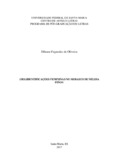| dc.creator | Oliveira, Dileane Fagundes de | |
| dc.date.accessioned | 2018-04-17T11:48:40Z | |
| dc.date.available | 2018-04-17T11:48:40Z | |
| dc.date.issued | 2017-02-21 | |
| dc.identifier.uri | http://repositorio.ufsm.br/handle/1/12984 | |
| dc.description.abstract | In this work we propose to build a mosaic of feminine characters in some short stories by
Nelida Piñon to understand their representation. In so doing, the following narratives were
selected : ‘I Love My Husband’, published in O Cortejo do Divino e outros contos escolhidos
( 2007); ‘Colheita’, in Sala de Armas (1997); ‘Aventura de Saber’, ‘Breve flor’ and ‘Os
Selvagens da Terra, published in O Tempo das Frutas (1997) and ‘A Camisa do Marido’,
found in the book that receives the same title (2014). The analysis attempts to reveal certain
aspects related to the patriarchal cultural system of values, specially those about gender
relationship, historical and social practices that have interfered in those relations along the
centuries. We tried to understand the way Piñon’s subversive writing contributes to
deconstruct and denaturalize discourses and practices that, by indulging with Patriarchy, have
legitimized both the hierarchical and dualist power relations between the masculine and the
feminine genders and the regulations of social roles. As regards the historical, feminine
trajectory, the theoretical foundation provided by Simone de Beauvoir, Céli Regina Jardim
Pinto, Constância Lima Duarte, Heloísa Buarque de Hollanda, Nelly Novaes Coelho among
others, was of high relevance to this research. To reflect upon questions of gender and
feminist developments, we resorted to the concepts by Joan Scott, Judith Butler and Teresa de
Lauretis that helped to sediment the analysis of the stories. In order to emphasize certain
aesthetic aspects related to Piñon’s writing, we researched the studies by Lucia Osana Zolin
and Nomi Hoki Moniz, as well as the writer’s own considerations about her work. Along this
study, we observed the author’s compromise with a feminine literature: her texts preserve a
recurrent dialogue with some of the discussions led by the feminist segments as they attempt
to unfold the traditional and stereotyped mechanisms about women through a discourse that is
ironic, inquisitive and defiant. Such an investigation allows us to verify the way the author
constructs a remarkable variety of female protagonists whose profiles keep a distance - in a
higher or lower degree - from the traditional woman portrayal. | eng |
| dc.language | por | por |
| dc.publisher | Universidade Federal de Santa Maria | por |
| dc.rights | Attribution-NonCommercial-NoDerivatives 4.0 International | * |
| dc.rights.uri | http://creativecommons.org/licenses/by-nc-nd/4.0/ | * |
| dc.subject | Nélida Piñon | por |
| dc.subject | Representação | por |
| dc.subject | Questões de gênero | por |
| dc.subject | Nélida Piñon | eng |
| dc.subject | Representation | eng |
| dc.subject | Questions of gender | eng |
| dc.title | (Des)identificações femininas no mosaico de Nélida Piñon | por |
| dc.title.alternative | A mosaic of feminine identifications/representations in Nélida Piñon’s work | eng |
| dc.type | Dissertação | por |
| dc.description.resumo | Nesta dissertação, propusemo-nos a compor um mosaico de personagens femininas presentes
em narrativas curtas de Nélida Piñon, para procurar entender como as relações de gênero,
práticas sociais e históricas interferem nessas representações em: “I love my husband”,
publicado no livro O cortejo do divino e outros contos escolhidos (2007), “Colheita”, presente
no livro Sala de armas (1997), “Aventura de Saber”, “Breve flor” e “Os selvagens da terra”,
publicados no livro O tempo das frutas (1997) e “A camisa do marido” presente no livro
homônimo publicado em 2014. Assim, objetivamos compreender como a escrita de Nélida
contribui para a desnaturalização e desconstrução de práticas e discursos que legitimam as
relações hierárquicas e dualistas de gênero e a normatização de papéis sociais. Na
fundamentação do resgate histórico da trajetória do feminino utilizamos reflexões de
intelectuais como Simone de Beauvoir, Céli Regina Jardim Pinto, Constância Lima Duarte,
Heloisa Buarque de Hollanda e Nelly Novaes Coelho. Para pensar as questões de gênero e os
desdobramentos do feminismo, recorremos às reflexões de Joan Scott, Judith Butler e Teresa
de Lauretis. Para construirmos um panorama sobre a obra de Piñon nos utilizamos dos
estudos de Lucia Osana Zolin e Naomi Hoki Moniz, bem como as ponderações da própria
escritora Nélida Piñon. Em suas narrativas, evidenciamos o claro compromisso da escritora
em manter um diálogo constante com as discussões tencionadas pelos segmentos feministas,
uma vez que realiza um desnudamento do mecanismo de construção do feminino, por meio de
um discurso inquiridor, irônico e subversivo. A partir dessas considerações, elaboramos uma
análise a fim de averiguar que maneira a escritora constrói a representação plural das
protagonistas de cada conto, mantendo uma atenção para as marcas de aproximação e
afastamento de perfis legitimados socialmente. | por |
| dc.contributor.advisor1 | Silva, Vera Lucia Lenz Vianna da | |
| dc.contributor.advisor1Lattes | http://lattes.cnpq.br/8773425081130876 | por |
| dc.contributor.referee1 | Ramicelli, Maria Eulália | |
| dc.contributor.referee1Lattes | http://lattes.cnpq.br/6281610122950296 | por |
| dc.contributor.referee2 | Maggio, Sandra Sirangelo | |
| dc.contributor.referee2Lattes | http://lattes.cnpq.br/0866814477504163 | por |
| dc.creator.Lattes | http://lattes.cnpq.br/5507504136581028 | por |
| dc.publisher.country | Brasil | por |
| dc.publisher.department | Letras | por |
| dc.publisher.initials | UFSM | por |
| dc.publisher.program | Programa de Pós-Graduação em Letras | por |
| dc.subject.cnpq | CNPQ::LINGUISTICA, LETRAS E ARTES::LETRAS | por |
| dc.publisher.unidade | Centro de Artes e Letras | por |



